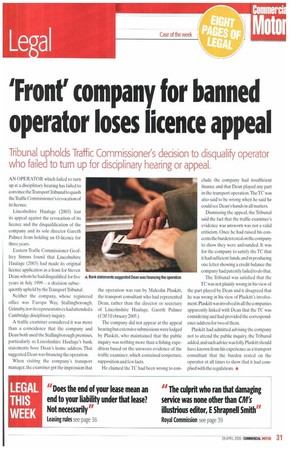'Front' company for banned operator loses licence appeal
Page 31

If you've noticed an error in this article please click here to report it so we can fix it.
Tribunal upholds Traffic Commissioner's decision to disqualify operator who failed to turn up for disciplinary hearing or appeal.
AN OPERATOR which failed to turn up at a disciplinary hearing has failed to convince the TransportTribunal to quash the Traffic Commissioner's revocation of its licence.
Lincolnshire Haulage (2003) lost its appeal against the revocation of its licence and the disqualification of the company and its sole director Gareth Palmer from holding an 0-licence for three years.
Eastern Traffic Commissioner Geoffrey Simms found that Lincolnshire Haulage (2003) had made its original licence application as a front for Steven Dean. whom he had disqualified for five years in July 1999 — a decision subsequently upheld by the Transport Tribunal.
Neither the company, whose registered office was Europa Way, Stallingborough, Grimsby, nor its representatives had attended a Cambridge disciplinary inquiry.
A traffic examiner considered it was more than a coincidence that the company and Dean both used the Stallingborough premises, particularly as Lincolnshire Haulage's bank statements bore Dean's home address. That suggested Dean was financing the operation.
When visiting the company's transport manager, the examiner got the impression that the operation was run by Malcolm Plaskitt, the transport consultant who had represented Dean, rather than the director or secretary of Lincolnshire Haulage. Gareth Palmer (CM 3 February 2005.) The company did not appear at the appeal hearing but extensive submissions were lodged by Plaskitt, who maintained that the public inquiry was nothing more than a fishing expedition based on the unsworn evidence of the traffic examiner, which contained conjecture, supposition and few facts.
He claimed the TC had been wrong to con elude the company had insufficient finance and that Dean played any part in the transport operation.The TC was also said to be wrong when he said he could see Dean's hands in all matters.
Dismissing the appeal, the Tribunal said the fact that the traffic examiner's evidence was unsworn was not a valid criticism. Once he had raised his concerns the burden rested on the company to show they were unfounded. It was for the company to satisfy the TC that it had sufficient funds, and in producing one letter showing a credit balance the company had patently failed to do that.
The Tribunal was satisfied that the TC was not plainly wrong in his view of the part played by Dean and it disagreed that he was wrong in his view of Plaskitt's involvement. Plaskitt was involved in all the companies apparently linked with Dean that the TC was considering and had provided the correspondence address for two of them.
Plaskitt had admitted advising the company not to attend the public inquiry, the Tribunal added, and such advice was folly. Plaskitt should have known from his experience as a transport consultant that the burden rested on the operator at all times to show that it had complied with the regulations. •










































































































































































































